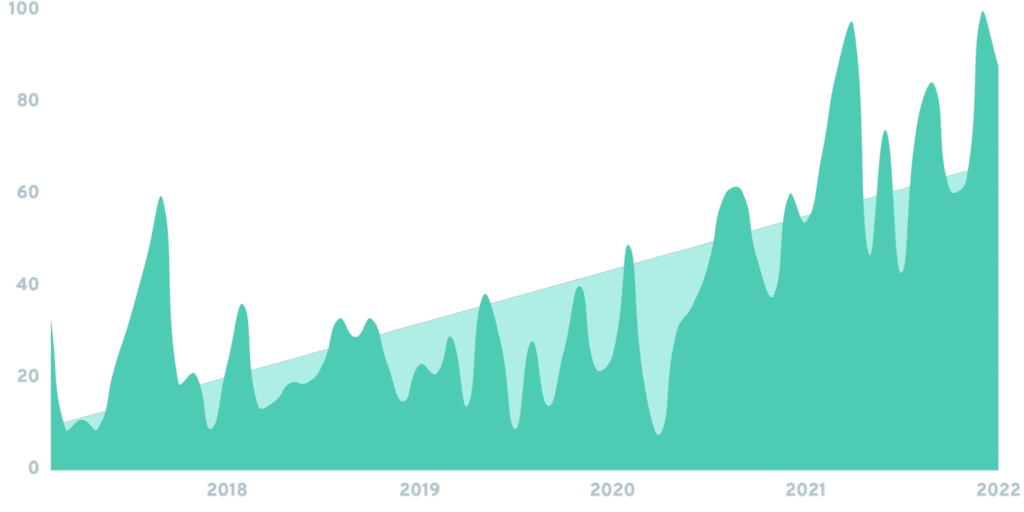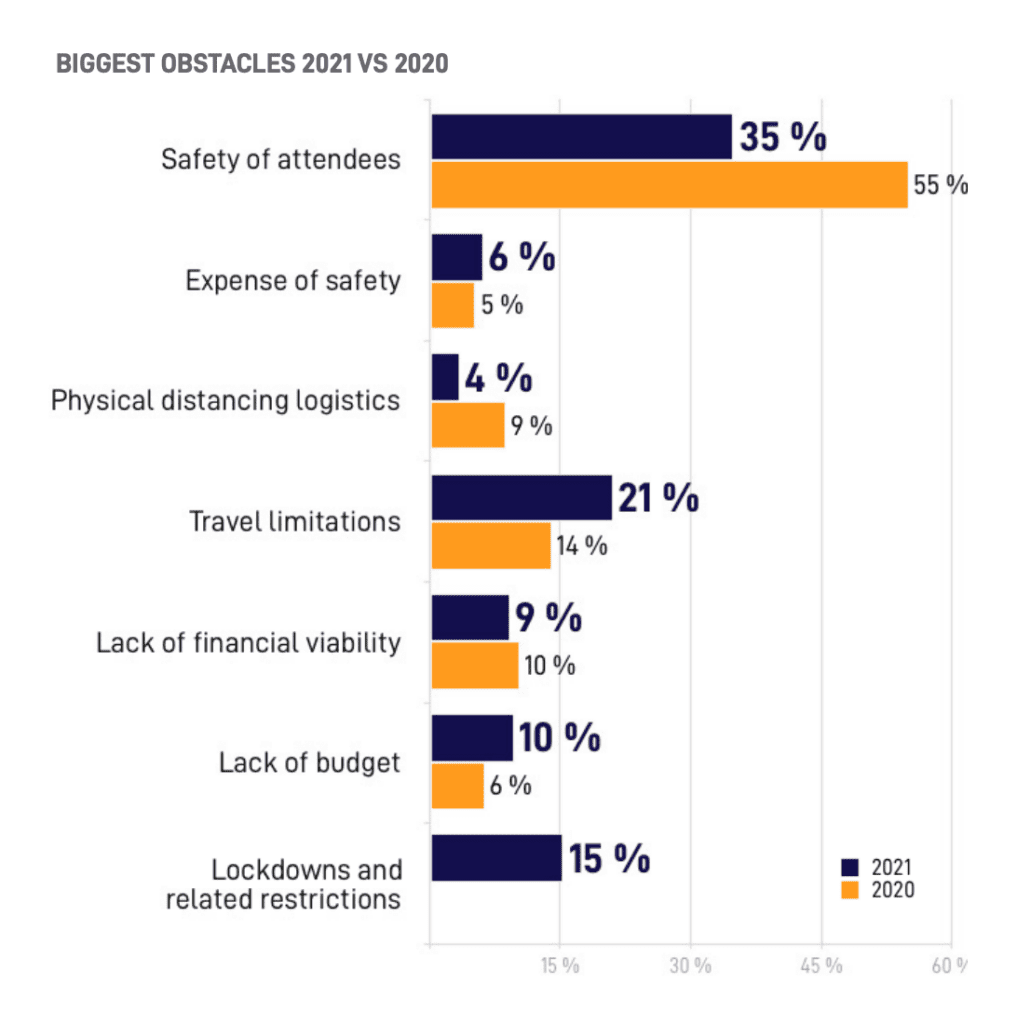This eBook is also available to download.
The promising growth of the Event Management industry was unfortunately derailed by the coronavirus pandemic in 2020. Certain events were deeply impacted by the absence of in-person activities. The industry was valued at $1,135.4 billion in 2019. Allied Market Research also expected it to grow annually by 11.2% from 2021-2028. Unsurprisingly, the report created by ‘Allied Market Research’ couldn’t account for the pandemic at that time. So, the projected growth might look slightly different.
After two challenging years for the event industry as a result of a worldwide lockdown, companies are eager to recover their losses through the reopening of in-person activities. Despite the prominence of virtual events during the pandemic, the future of the event management industry looked uncertain as long as the restrictions were in place. The goal of this ebook is to provide an insight of the future trends of the event management industry. However, it is important to remember that there are expected to be significant differences in statewide, nationwide, and events-wide trends due to the following reasons:
- States and Provinces in North America have independently set and maintained lockdown restrictions in the past 2 years.
- The impact of coronavirus and the time for recovery has been contrasting for countries.
- Some events were unable to move virtual, while some events benefited due to technological advancement in the past few years.
Signs of Recovery
Nevertheless, there are already great signs of recovery shown in the past few months. 2022 has seen the return of the following major events:
- Sport Events:
- All four professional sports leagues in North America have returned to full stadium capacity.
- 70,000 people watched the Super Bowl Sunday in 2022 live from the stadium compared to 25,000 in 2021.
- The NBA All-Star game was played at full capacity of 20,000 in 2022. However, for the 2021 All-Star game, the highlights were the artificial crowd noise, virtual fans, and heavy criticism from influential NBA players.
- Music Festivals and Concerts:
- A staggering 750,000 people attended the Coachella Music Festival over two weekends in 2022, after cancellations in 2020 and 2021. The event brought $600 million to the local economy and hundreds of new jobs.
- 2,500 attendees were present for the Oscars in 2022, and an increase in 5 million viewers in comparison to 2021.
- Most music festivals and concerts are expected to return to full capacity by 2023. We will also likely see the removal of mask and vaccine mandates across most states in the United States.
- Business Conferences and seminars:
- Domestic business travel isn’t predicted to fully recover until 2024. Foreign business travel isn’t likely to return until the following year.
- Since 2020, 93% of event organizers sought new business models, the majority of which were digitally led.
- The rapid development of online events platforms is likely to affect face-to-face business events, as companies adapt to move their conferences into a hybrid structure.
- Even once live events return, 71% of event planners stated they would continue to use a digital strategy.
Impact of the Global Pandemic on Event/Venues
The Global Pandemic has disrupted the event industry massively. Before the pandemic, the events industry was a rapidly expanding sector. It involved producing live events for professionals, vendors, and the general public (audience). Corporate gatherings, meetings, business dinners, award evenings, exhibits, trade displays, concerts, and sports tournaments are all part of the event industry. Event-related businesses provide services such as event ticketing, hosting, event assessment, site exploration and procurement, catering, and end-to-end service delivery. However, since the pandemic, the demand for these services has significantly decreased. This is due to 2 major factors: Covid-19 restrictions and Travel Bans.
Covid-19 Restrictions
In the search for an effective vaccine, countries globally invested billions of dollars in different pharmaceutical and biotechnological companies to find a solution to this pandemic. However, conducting trials for a vaccine meant that countries and states had to look for immediate mitigation strategies to prevent the spread of covid. The immediate response was to create certain social distancing restrictions. These varied from issuing a stay-at-home order to travel bans to the closure of businesses and outdoor events.

Some businesses were required to operate due to their essentiality to human health. The events industry, however, had no choice but to cancel any event that required travel or any sort of in-person interaction. The decision to return to in-person activities was only taken after the vaccinations had successfully completed trials and received FDA approval. Unfortunately, the distribution of the vaccine to the public was relatively slow. So, most businesses had to run their business with capacity restrictions as well as vaccines and mask mandates.
Travel Bans & Restrictions
The arrival of vaccines brought hope to local businesses in North America. However, international travel was still heavily restricted which significantly impacted the Event Industry. In 2021, global events were still far from returning back to normal as new variants of covid started resurging. Gradually, as vaccination rates started increasing, state governments started easing travel and capacity restrictions to allow businesses to restart working. The event industry, as a result, started to provide venues with limited capacity by mandating social distancing protocols. To incorporate the issue of international travel rules, the event industry shifted its focus toward emerging technologies. These have made it easier to reach larger audiences.
Virtual Events
The Event Management Industry has evolved dramatically as a result of technological advancements. For instance, event management platforms offer tools that cover many areas of event management in a single solution. They also give tools to expedite the event planning process. Large-scale events, such as conferences, festivals, trade exhibitions, and professional organization meetings, may be managed using these platforms. These solutions help event planners plan and manage events from start to finish. They often include features like attendee and/or exhibitor registration, payment processing, agenda building, event promotion, and attendee engagement. Event management software helps bridge the gap between the physical aspects of events (venue, equipment, catering, attendees, etc.) and the digital aspects (such as event registration, social media promotion, and email marketing).
However, since the pandemic, event management software providers have started to provide virtual access to events. This has largely reduced the need for physical event management such as looking for venues, setting up the equipment, ensuring safety from any potential equipment malfunction, etc. Unsurprisingly, virtual events are less costly in comparison to physical events. This is generally because the number of personnel required at the event substantially decreases.
Impact to Experience
Virtual events are unlikely to provide the same experience as physical events. But, it is likely that hybrid events may be the way to go in the future. As per McKinsey’s report on March 1st, 2022, the pandemic phase looks to be ending. Yet the report suggests that risk factors of new variants may still create a sense of fear in attending in-person activities among the population. This certainly means that events are unlikely to completely shift away from digital platforms. The new model of virtual events is exciting for various reasons!

Virtual events were valued at about $78 billion in 2019. They are also predicted to rise at a rate of 23.2% annually from 2020 through 2027. As it turns out, virtual events provide many of the same benefits as live events, and much more. Online events have become the new normal for many firms, just as Zoom has become a part of our lexicon for online meetings.
Technology
Online experiences range from simple to sophisticated, with something to suit every HR communication need. Some companies allocate funds to one of the increasingly complex software solutions that simulate the architecture of a real meeting. Participants enter through a lobby, select an avatar, go from room to room, and network in virtual lounges. This method is very useful for turning a live annual enrollment benefits or health fair into a virtual one, as well as producing a large recruitment event. Others prefer more modest webinar techniques. Employees watch a live panel and ask questions through chat, similar to the online calls that many of us already often attend. This is ideal for instructional presentations, training, or leadership fireside talks. Subsequently, this model of virtual events may be here to stay post-pandemic for the following reasons:
Increasing Work from Home (WHF)
The work-from-home (WFH) culture has firmly taken root. Many aren’t ready to give up the shorter commutes and improved work-life balance. More employers are adopting WFH since nearly two-thirds of employees presently working from home stated they would resign if forced to return to the office. Business travel rates are projected to increase as the health issue fades. However, according to a recent study by the Global Business Travel Association, 55% of employers do not expect employees to attend in-person events right away. While more people may attend live events by the end of the year, the bulk of people will participate from their homes or offices for the time being.
Virtual events save money.
The expenditures of flying people in, putting them up in hotels, and giving meals or spending vouchers are all eliminated when you host a virtual event. In these cash-strapped times, that’s a wonderful benefit. There are no production or venue charges for organizations, however, there may be costs connected with the online meeting platform. According to a study performed by software firm Wild Apricot, 84% of businesses that had a virtual event in 2020 paid less than they did for in-person events.
Technological advances are creating seamless experiences
Software advancements such as networking possibilities and breakout sessions, in addition to the advanced interface solutions, stated previously, produce an overall experience that rivals in-person gatherings. Furthermore, while everyone is already seated at their laptops, employee engagement strategies like live polling and on-the-spot surveys can be conducted more easily.

Virtual events are calendar friendly.
Virtual events don’t only save everyone money and time by eliminating the need to travel. They also make personal and professional calendars easier. Without having to travel, you’ll save time, be more productive, and miss fewer meetings. This implies fewer tensions around home concerns like childcare or eldercare in an age of remote learning and a more flexible work-life balance. It’s also usual practice to record virtual sessions on behalf of folks who can’t clear their schedules. If you are unable to attend in person, you can watch the replay at your leisure. In-person events, on the other hand, cannot claim this.
Virtual space is everywhere at once.
Are your employees dispersed over many locations, cities, or even countries? A lot of Celayix’s clients have employees that are spread out across the country. Even before the epidemic, these groups had difficulty reaching everyone at the same time. So, why go on the road with your show? Virtual events are a natural way to provide a consistent experience regardless of where you work. They also have the advantage of being able to manage the message so that everyone sees and hears the same thing.
Virtual events have become a great PR tool for the reasons stated above. Yet, the focus of events might be shifting towards a marketing vehicle rather than a revenue source. This has some positive and negative implications. Mainly, 80% of organizations including major companies like Microsoft have offered free registration for their events. Hence expanding their reach and accommodating a larger unsegmented audience. Unfortunately, while consumers benefit from free registration, the profitability of the events has significantly decreased. With profitability at cost for this new value proposition, companies have started to make some organizational changes to cut the additional costs.
Downsizing of the workforce
The slowdown of the economy as a result of the worldwide lockdown has halted economic activities in many industries. The unforeseen nature of the pandemic has led to almost a year-long economic slowdown. This recession would be considered one of the shortest in length. Yet it has had one of the greatest impacts, as per the economists from NBER. The most difficult part of an economic recession is the increasing unemployment rate that follows it. Companies have tried their best to maintain some economic activity and resultantly keep all of their employees. Unfortunately, though, the impact of the pandemic has resulted in many businesses becoming insolvent.
The impact of the pandemic has been difficult for a lot of companies. A lot of jobs within the event industry were under scrutiny as a result of the worldwide lockdown. 90% of event professionals have lost part or all of their business since March 2020. Only 5% of the population was affected, with 2.75 percent losing their jobs. By November 2020, 52% of event professionals had lost revenue as a result of the epidemic, with 11% furloughed and 10% laid off. Live events are the last in line for reopening, and also hurt the most due to the shutdown. Resultantly, approximately 12 million live event workers have been seeking government relief in the United States.
The Great Resignation
On the other hand, the pandemic has also brought about a new phenomenon: ‘The Great Resignation’.

The Great Resignation became prominent in the last quarter of 2021. More individuals have started to leave their current jobs for newer jobs due to a variety of reasons. This increase in voluntary and involuntary unemployment has significantly left companies understaffed. Thus, creating a vicious cycle of employees feeling burnout and leaving jobs more rapidly.
Whether this downsizing of the workforce is just temporary can only be better known over time. But the effect of this pandemic is likely to create some permanent changes in the event management industry. Let’s look at some of the changes that occurred during the pandemic that is likely to stay in the event management industry.
Changes that came from the Pandemic, that are here to stay
Life post-covid is going to be very different from what was projected back in 2019. The world is excited about what the next decade has in store. With significant changes made by organizations in their decision-making process for the betterment of society, it would be surprising if companies revert back to their pre-covid business model. Within the event management industry, the emerging technologies that were developed as a result of rapid change and experimentation are likely to be the driving force for the next decade. Consequently, these technologies are going to change the way events are conducted. It will also change how jobs are provided within event management companies. To be precise, there are 3 topics or issues that would be the center of the conversation:
– Improved health and safety measures
– Hybrid event models
– Labor Market Response: Increase demand for Job Flexibility
In this section, we will take a look at each topic and understand why they are here to stay.
Improved health and safety measures
As events make a return to being run in-person, a lot of event managers are having difficulty finding an effective roadmap to follow. Why? The main obstacle for returning to in-person events continues to be a concern for attendee and stakeholder safety. In research conducted by EventMB in 2020, over half of respondents found the safety of attendees as the greatest obstacle. Of course, this was before an effective vaccination was established. The same survey in 2021 showed similar results. Over one-third of the respondents were worried about the safety of attendees in returning to in-person events. It’s clear that for the next few years, safety will be the utmost priority for most event managers.

Unsurprisingly, the other obstacles that are likely to persist as per event managers are potential travel limitations and lockdown restrictions. With a goal to minimize exposure, improved health and safety measures will become common for attendees at the airports or at venues. Besides government guidelines and guidance from local officials, there are certain measures that event organizers should increasingly adhere to. This is generally to incorporate the health and safety of the consumers. Let’s look at these guidelines and measures that are likely to remain constant for a significant period of time.
1. Government Guidelines for any Event or Large Gathering
The current Government Guidelines in 2022 are not mandatory to be followed. They are essentially there to provide the highest level of protection to workers and attendees. It’s expected that event managers conduct multiple public health measures. These include a written workplace COVID-19 safety plan supported by a risk assessment. While they recommend that ‘the best way to reduce exposure is to hold the event virtually’, they give certain tips on how to apply COVID-19 control measures. These tips can be beneficial for the health and safety of all attendees for any in-person event that takes place in the future.
2. Ventilation in Indoor Space
- Any large event in indoor areas should be well ventilated; in general, the more enclosed the room, the more ventilation is required.
- Seek assistance from a heating, ventilation, and air conditioning (HVAC) professional. Learn how to improve air exchanges per hour while reducing or eliminating recirculated air, as well as information on possible air filtration and disinfection upgrades, and HVAC system maintenance and cleaning.
- If feasible, open windows and doors.
- Exhaust fans in bathrooms and kitchens should be vented to the outside and run at a low speed. This removes polluted air while minimizing pressure fluctuations.
- Air circulation or cooling fans should not direct air movement from one person to another.
- Consider portable air filtration equipment with high-efficiency particulate (HEPA) filters if ventilation cannot be increased.
3. Physical Barriers and Distancing
- Where practicable and acceptable, use barriers to separate personnel from guests. Avoid blocking aisles or exits (i.e., emergency escape). Barriers might be placed in locations such as the reception/box office, as well as between urinals in restrooms.
- Respiratory droplets should be blocked by barriers. At least once a day, clean and disinfect barriers.
- Physical Distancing requires people to maintain a safe distance from others (at least 2 meters in all directions). Avoid non-essential in-person interactions, and minimize the length and duration of interactions.
- Attendees of events can further exercise safety by distancing each other during any queues. This can be put into better effect through the installation of stanchions or floor markings by event planners.
4. Hygiene Measures
- Events managers would be heavily encouraged to provide hand sanitizer dispensers and handwashing stations near high-traffic areas. The dispensers should be regularly checked for any restocking needs.
- Reduce the number of high touch points by installing automatic doors, faucets, etc. Replace physical forms with electronic forms when necessary.
- Post signs and infographics that can be seen about the infection spreading, keeping hygiene, etc.
5. Screening and Contact Tracing
- Requiring a proof of vaccination or a recent negative test might be necessary for the short run for any large gathering.
- Administer health screening questions to all workers and attendees before they are allowed into the venue.
- Ensure that everyone’s contact information is stored and provided to the local public health authority for the purpose of contact tracing.
6. Masks and other protective measures
- Follow your local public health authorities and jurisdiction’s mask-wearing regulations. When there is a higher risk of COVID-19 dissemination (e.g., poor vaccination coverage, increased community spread, variations of concern) or when physical separation is not practicable, mask-wearing should be advocated as an extra safeguard.
- While non-medical masks can help prevent the spread of covid-19, other Personal Equipment can help better safeguard any attendee’s health.
All these health and safety measures are likely to stay and improve further to ensure the minimal spread of covid-19 and help safeguard people when present in large gatherings.
Hybrid event models
Hybrid event models are likely to become more prominent. They combat the individual issues associated with in-person and virtual events. By bringing the best of both worlds, hybrid event models are rapidly becoming the preferred model for event managers. With the hope to recover the lost revenue from the past few years, Hybrid events are the way to go! Let’s explain why.
While many consumers want to attend on-site events again, EventMB estimates that 71% of event planners will continue to provide virtual access to their events. This is because hybrid events combine the best of both worlds. They allow companies to engage consumers electronically and at scale while still providing a venue for intimacy and informal networking.
Organizers have realized that there is a significant difference between organizing high-quality hybrid events and just streaming your event online, in accordance with the trend toward more dynamic events. According to Markletic research, 81% of event planners believe that providing networking opportunities is critical to generating satisfying hybrid events. As customers return, they are becoming more open to the concept of combining digital and in-person events. After COVID-19, 65% of attendees and 57% of exhibitors feel that digital will continue to work for events.
How Technology Helps
Furthermore, planners are unlocking event functionalities by merging diverse tools and platforms to offer these next-level hybrid events. Technology interoperability is critical because these technologies must work together to produce smooth and entertaining event experiences. These technologies raise the question, how do event managers find the perfect combination of in-person and virtual events to provide an amazing hybrid experience.
Create a smart technology plan
A unified technology strategy lays out what technology you’ll be employing and how it will assist you to achieve your event objectives. This strategy should include whatever digital technologies you’ll employ for your events, as well as a method for implementing them. Your tools should ideally be coordinated and complimentary, with no gaps in features or overlaps in functionality. Regularly review your technology plan to stay current with new technologies and guarantee that your platforms run well.
Focus on broadcast quality
As virtual events get more complex, event planners must seek to improve their events’ audio and visual quality. Consider adding extra cameras to stream events from different perspectives and incorporate exclusive footage from around the venue. Training your speakers on broadcasting best practices will help them get the most out of their equipment while giving a more professional presentation.
Keep yourself updated with industry professionals
Industry professionals regularly update about event industry trends, and they provide some key insights into potential challenges that event companies might face. In an article published by Forbes, various event industry professionals gave their outlook on the expected changes within their industry. To summarize their points:
- They expect communities will connect in ways that boost their return on investments and improve efficiency by combining virtual and face-to-face encounters. This tendency will make hybrid events and a new generation of face-to-face event experiences easier and faster.
- They expect event companies to benefit from virtual events’ low cost and higher reach, and hence their investments are likely to tend towards advanced technology.
- They, however, are cynical that only companies that can provide high-quality virtual experience are likely to be able to move towards hybrid events. Resultantly, companies with lower budgets might have to focus on either in-person or virtual events.
- Personalized events are likely to be key as events are likely to be in a restricted capacity. Event companies are likely to move towards exclusive invites and have promotional campaigns for highly interactive events. These interactive events would require a great level of marketing with personalized and authentic messaging.
- They urge companies to focus on attendee engagement as their feedback regarding past events is likely to help improve the quality of future events.
All in all, many professionals have called hybrid models the ‘golden ticket’ for event companies, but it’s important that event managers clearly define what their hybrid model will look like.
Labor Market Response: Increase demand for Job Flexibility
Given the changes that might take place in the event management industry, there are likely to be some structural changes in the employment model for companies. The greatest difficulty that is expected for the near future would be rehiring staff or replacements to tackle the great resignation. The great resignation was a result of the labor market’s increase in willingness to find better and more suitable jobs that provide more autonomy and flexibility. The event industry has historically been limited in providing flexibility, and hence the difficulty in hiring full-time staff is likely to be more prominent.

To combat this issue, event companies are resorting to new employment models, particularly hiring contract or agency workers. Outsourcing has predominantly been an expensive option but a reliable backup for event managers. However, in this new employment model, event managers are able to find independent contract workers that make themselves available to help support an event. Without necessarily requiring to contact an agency, event managers can directly get in contact with potential employees through online software.
These online tools provide event managers with the ability to shift their employment model towards an affordable and fast system that helps employers connect with potential employees. This way, if there’s an event taking place the upcoming week and there’s a need for staff to help set up the venue, online platforms can help create super-quick shifts for available candidates that can confirm their availability for the event setup immediately through mobile apps. Resultantly, these jobs provided are more flexible not only for the employees but for the employers too as they can readily hire independent contract workers for any given hours that both employer and employee find suitable.
Job Security
Nevertheless, it’s important to keep in mind that employees’ largest concern remains job security, and there is likely to be a shift in the type of skills required within the workforce of an event management company. Since live events are still in short supply, most event planners are either underemployed or unemployed. According to a recent EventMB poll, nearly 20% of event professionals have lost their jobs due to layoffs and mandatory furloughs. How can event professionals protect their careers in an industry that is battling to retain its present workforce?
It’s important that event planners adapt to the macroeconomic events as well as the technology changes that take place. Event planners need to remain focused on these nine critical areas for networking, job sourcing, and professional growth to stay ahead of the event employment market:
- Sites for networking
- Event Communities and Resources for Networking
- Monitor Job Boards
- Virtual and Hybrid Event Planning Continuing Education Credits and Certifications
- Webinars and Other Informative Resources
- Personal Brand Development and Marketing
- Engagement Tools and Techniques
- Counter-viral and cyber-threats security measures
- Liability and Contract Negotiation Information
The report made by EventMB provides a more detailed overview of what the event industry and event staff should get ready for, as the world starts to recover. Consequently, as the event industry strives to improve the experience of the event for the attendees, event companies are required to find employees that can boost their recovery and help provide excellent service.
The Future of the Event Management Industry
Keeping in mind the changes that the pandemic brought to this industry, it is important to highlight how the market is expected to grow. Moreover, there are some of the greatest game-changing trends in the industry that event planners ought to know and apply. Let’s look at some of them:
Multifunction flexibility with additional value is an event planning trend to keep an eye on.
People these days are set on getting the maximum purpose and utility out of everything, from cellphones to small dwellings. What does this mean for events?
Consider how every facet of the event may provide you with more value. Consider every aspect of the event, from the material to the activities to the way you connect guests. Here are a few suggestions:
- On the back of name tags, print a timetable summary.
- Include a “save the date” for next year’s event in any swag bags you give away.
This is not only “in,” but it’s also cost-effective, environmentally friendly, and considerate to your guests. Business executives are picky about how and with whom they spend their time. Taking a step back and examining each aspect of the experience can guarantee that your event is worthwhile. In this manner, you can ensure that participants will benefit from the takeaways while also leaving a lasting impression on personal development, progress, and inspiration.
Celebrating diverse voices is an important event planning trend
In general, society has become considerably more tolerant of differing viewpoints and interests. People are curious about ideas that are different from their own. What does this mean for events?
Outside-the-box thinking will always be a popular topic at events, but we don’t always consider it when selecting speakers.
One of the most effective methods for delivering a new viewpoint that may actually ignite creative thought is to Invite keynote speakers from industries other than your own. It might even be a speaker who challenges mainstream belief or practice in many circumstances.
If it seems hazardous, don’t worry: over 70% of participants believe that opposing viewpoints are essential for developing excellent ideas. Bring in speakers who will push audiences to think wider and broader to ensure that attendance is stimulated.
Personalization is a fantastic trend in event planning.
Consumers want customized experiences — both online and in-person — with targeted advertisements, bespoke emails, and other forms of personalization. What does this mean for events?
Using an attendee’s name in conference emails isn’t the only way to personalize an experience. However, personalization does not have to be tough. Consider the following simple concepts:
- Ask participants to vote on which sessions will be given before the event. (By doing so, you may ensure that guests get what they want while also making them feel more immersed in the event.)
- Create a conference app that delivers individualized activity ideas in real-time based on pre-loaded data.
- Add a customized map of the region to the same app, highlighting famous eateries and activities outside of the conference.
A new event planning trend is thoughtful sustainability.
While being green isn’t a new concept, the current trend in sustainability promises to test both inventiveness and ingenuity. What does this mean for events?
As an event planner, you may build a considered strategy that reflects your event’s dedication to the environment by being aware of society’s increased interest in reusing, repurposing, and recycling.
The majority of individuals in the world today prefer items manufactured from recyclable materials to those that aren’t. As a result, when you pick goods created from biodegradable or recycled materials, your guests will notice and appreciate it. It might be as easy as selecting environmentally friendly name tags, registration bags, or food cartons.
Offering sustainable, fair-trade food alternatives is another trend in this arena. Donate any food, flowers, or drinks that are leftover or unwanted to community groups such as homeless shelters or elderly care institutions.
Knowing the trends that are defining the event management business will help event managers to take advantage of them and create more memorable experiences for their audiences.
However, implementing all of these modifications at once is impossible. When it comes to changing and improving their events, event managers must be methodical. In order to help event managers be more methodical, Celayix provides a smart and integrated solution that solves most workforce management-related problems. We’ll look at it in the next section!
How Celayix can Help
Celayix’s Employee Scheduling Software, unlike any other scheduling software, provides event managers and the event company the ability to take care of any workforce scheduling problem possible. From fixing overtime issues to managing last-minute event changes, Celayix provides 100% Compliant event staff schedules at the touch of a button. With the help of Celayix’s rules-based engine, scheduling contract workers in the present or in the future is effortless. Event staff will enjoy flexible self-scheduling, shift-bidding, shift-swapping, pre-shift health checks, and automated safety checks for when they may be working by themselves.
Summary
Event Management is one of the fastest-growing industries. Over the years, we’ve witnessed a tremendous movement in event planning trends, aiming at improving the services provided to guests and changing the whole sector. People are becoming increasingly concerned about the quality of their experiences as time passes. As specialists have extensively evaluated all signals towards a more diversified use of digital technology to enhance customer experience over the previous year and a half, the future of event management is bright. While specific figures are yet unknown, the numerous applications and immense prospects it represents can only imply one thing: event management as we know it has changed.
Change is sometimes perceived as difficult in its early phases, requiring time to become acclimated to and adapt in the best possible way. A comparable transition from on-the-ground to digital event administration took place. When moving to an online platform, a sector that feeds on social connection and physical networking has to make significant changes. Today, as event professionals become more used to the transformation and develop a better grasp of its long-term benefits, the future of digital event management appears to be bright.
This eBook has been sponsored by Wyrk.io – a platform that helps event organizers find the talent they need when they need it.




